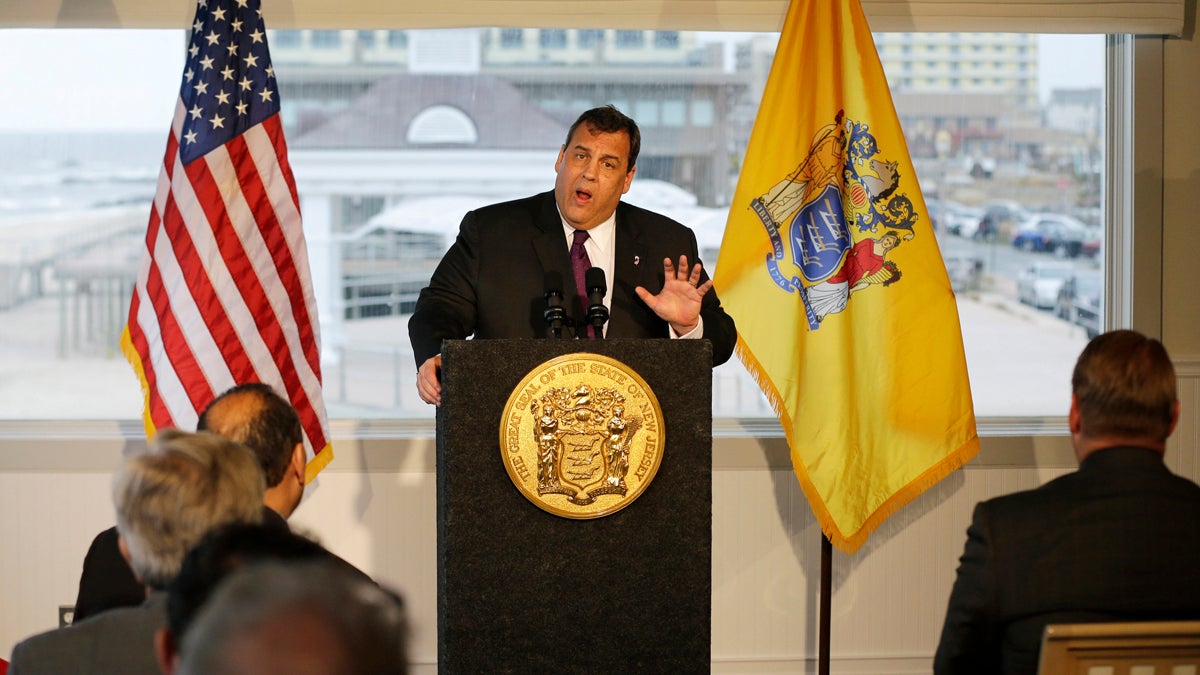If Christie becomes a top-tier candidate, his record on New Jersey’s economy could haunt him

New Jersey Gov. Chris Christie addresses a gathering near the Atlantic Ocean in Long Branch, N.J., Thursday, April 18, 2013. (AP Photo/Mel Evans)
While Gov. Chris Christie had a forceful answer at the ready when pressed on New Jersey’s lingering economic woes, and pundits gave him fairly good overall scores following Thursday’s GOP presidential primary debate, it’s not going to get any easier for Christie as the campaign season advances.
Despite Christie’s debate performance, political analysts say he did not put the economic issue fully to rest, and if he progresses in the presidential contest the fiscal questions will only get more pointed.
“They’re going to continue to ask him those questions all the way until inauguration day,” said Matthew Hale, a Seton Hall University political science professor.
What’s more, Christie’s answer to a direct question about New Jersey’s unemployment rate, underfunded public-employee pension system and series of credit-rating downgrades included some exaggerations that were left unchallenged during the debate. With so many candidates jockeying for position – including an unpredictable Donald Trump still in the mix – the New Jersey governor’s words will get much more scrutiny as the field narrows, if he’s still in it.
“It becomes an issue if Christie starts rising in the polls,” said Patrick Murray, director of Monmouth University’s Polling Institute.
New Jersey’s economic circumstances, as described by a Fox News moderator during Thursday night’s debate, do not paint the prettiest of pictures. Since Christie took office in early 2010, the state’s unemployment rate has consistently trailed the national average. And, at 6.1 percent it remains above the 5.3 percent U.S. unemployment rate.
The New Jersey public-employee pension system, despite Christie’s efforts to reform it, remains grossly underfunded, with at least $40 billion in debt as of the latest accounting.
The state Supreme Court has also just announced that it will take up a legal challenge of a major component of Christie’s signature 2011 pension-reform law in a case that could result in more than half of a projected $120 billion in savings being taken away.
And three major Wall Street credit-rating agencies have each lowered the state’s debt rating by three steps since Christie took office in early 2010, leaving New Jersey ranked among the lowest of all states when it comes to creditworthiness.
Questioned about NJ economy
Christie — who proved to be a capable debater in his two gubernatorial contests in New Jersey – on Thursday night attempted to deflect the difficult economic question by pointing out that his inauguration followed years of Democratic control of both the state Legislature and the governor’s office in Trenton. He also knocked Democrats in New Jersey for allowing significant job losses while enacting a series of tax hikes.
“If you think it’s bad now, you should have seen it when I got there,” Christie said.
The governor then rattled off a series of numbers, saying he balanced an $11 billion budget deficit, cut business taxes by $2.3 billion, and helped foster the creation of 192,000 private-sector jobs.
”We have a lot of work to do in New Jersey, but I’m darn proud of how we brought our state back,” Christie said.
But all of his statements included some degree of exaggeration that went unchallenged during the debate.
The budget-deficit figure he cited was not a true $11 billion gap, but a $10.7 billion “structural deficit” that didn’t require real-dollar cuts. The $2.3 billion in business tax cuts are part of an initiative that’s still being incrementally phased in, and his job-growth number leaves out public-sector losses that eat away at New Jersey’s overall gains.
Still, Christie’s campaign was impressed enough with his answer to immediately email reporters a “Here’s how far we’ve come in New Jersey” news release that included a YouTube video of his response and a transcript.
Hale, the Seton Hall professor, said Christie’s initial “you should have seen it when I got there” rebuttal was “very effective.”
“I think in terms of how he answered it, he got the soundbite,” Hale said.
“The narrative that he wants nationally is ‘Here’s this crusading conservative inside this nut-job liberal state,’” he said. “This is about the best I think he can do with that question.”
Murray, the Monmouth pollster, also said Christie’s answer was effective, especially since primary voters who are evaluating more than a dozen GOP hopefuls aren’t likely to dig into the numbers deep enough to notice his exaggerations.
“It only matters if the vast majority of voters have inch-thick binders on each of the candidates,” Murray said, adding that he’s yet to meet one of those voters.
The problem for Christie, however, is that his answer won’t stand as the final word on his economic record. That was made clear later in the debate, when Trump, the current frontrunner, got in a subtle dig at Christie’s economic record that came when Trump was asked about a series of bankruptcies his companies have been through, including his Atlantic City casinos.
Trump, in his answer, focused on how he was smart enough to get out of Atlantic City before it fully tanked, which occurred during Christie’s watch.
“I had the good sense to leave Atlantic City, which by the way, Caesars just went bankrupt, every company – Chris can tell you – every company virtually in Atlantic City went bankrupt,” Trump said as the screen split to show Christie reacting with pursed lips.
Others have better economic records
Compounding the problem for Christie is that other governors who have entered the 2016 GOP primary field, like Ohio Gov. Jon Kasich, have much better records when it comes to jobs and their own states’ fiscal performance. Former Florida Gov. Jeb Bush can also point to an economic revival that occurred during his eight years in office.
And for Christie, New Jersey’s economic woes have also likely played a role in his sinking popularity at home. A Rutgers-Eagleton Poll0 released last week showed he had low approval ratings on individual pocketbook issues, including 31 percent on his handling of the economy, 28 percent on tax policies and 22 percent on the pension problems. Only 30 percent of New Jersey voters gave him an overall favorable rating in the poll.
“Governor Christie has not experienced any kind of 2016 announcement ‘bump’ in ratings from voters back home – in fact, quite the opposite,” said Ashley Koning, assistant director of the Eagleton Center for Public Interest Polling at Rutgers University.
If Christie’s campaign begins to gain steam as a result of his debate performance – both Hale and Murray gave him high marks for how he handled a testy exchange on national security with U.S. Sen. Rand Paul of Kentucky – it will only make him more of a target. Attacks from other candidates that are focused on New Jersey’s struggling economy would likely become both more frequent and more direct.
“I think that going forward, as the candidates get more and more desperate for airtime . . . I would bet the other candidates are going to bring up the problems in New Jersey,” Hale said.
______________________________________________________
NJ Spotlight, an independent online news service on issues critical to New Jersey, makes its in-depth reporting available to NewsWorks.
WHYY is your source for fact-based, in-depth journalism and information. As a nonprofit organization, we rely on financial support from readers like you. Please give today.




